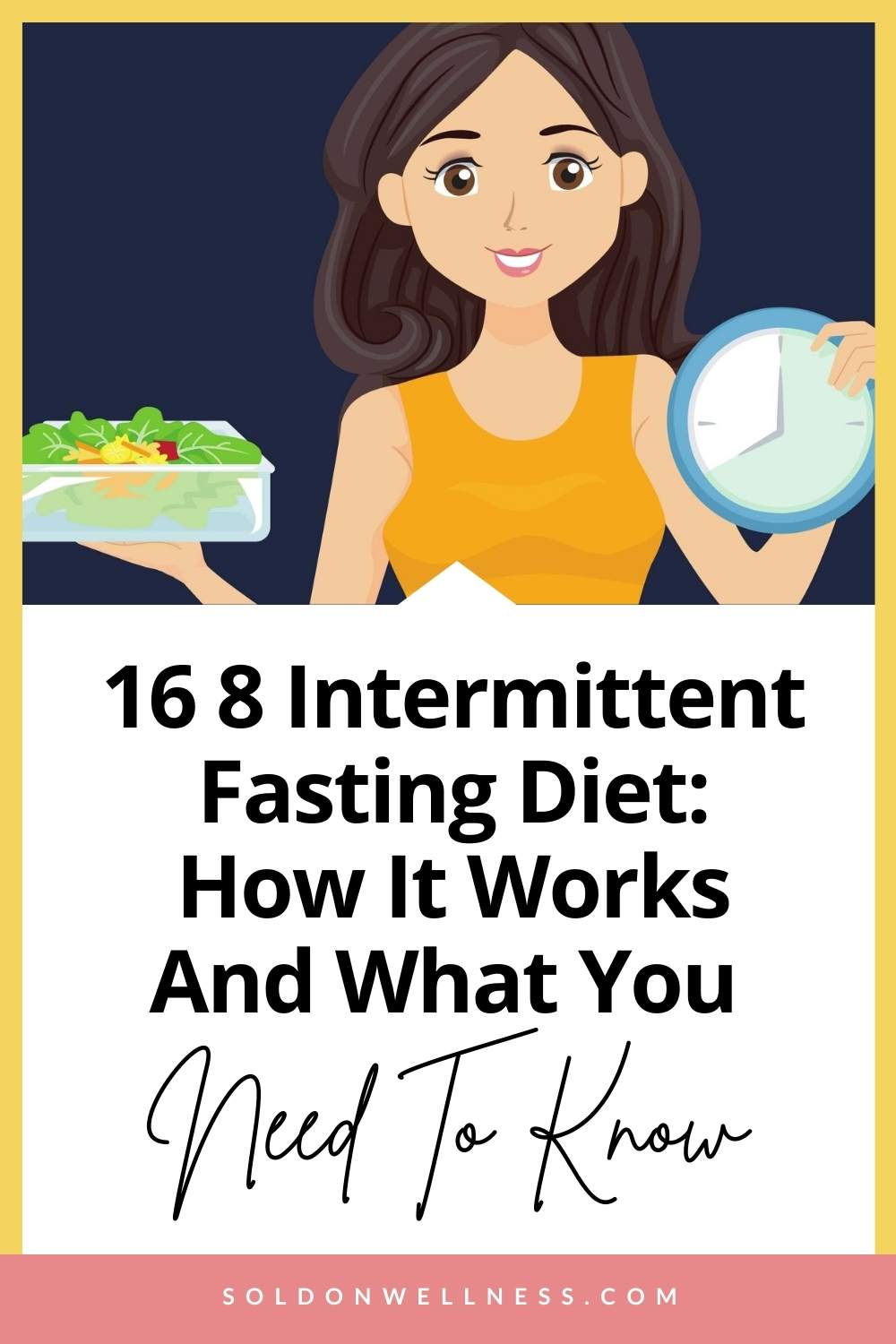16 8 intermittent fasting diet is a popular diet that has been making headlines recently.
While 16 8 intermittent fasting is far from new, the diet is starting to get a lot more attention due to its simple structure and appealing benefits, such as improved hormone regulation.
In this article. We'll look at what 16 8 intermittent fasting is and what you need to know if you want to try it.
What is a 16 8 intermittent fasting diet?

16 8 Intermittent fasting diet is what it sounds like: a pattern of eating that alternates between periods of eating and periods of fasting.
You eat your food for an 8-hour window each day, then fast for 16 hours (or more) before resuming the cycle.
The primary benefit of this is that when the body only has access to food for 8 hours each day, it goes into "starvation mode", which helps regulate hormones and burn fat instead of muscle mass or glycogen stores.
But even if you don't want to lose weight, intermittent fasting still offers increased productivity and improved brain function.
Benefits of 16 8 intermittent fasting

- Helps with hormone regulation, which can help you lose weight and keep it off more quickly than other diets.
- When the body only has access to food for 8 hours each day, it goes into "starvation mode" to keep itself alive, burning fat for energy instead of excess muscle mass or glycogen stores.
- This method is less dependent on exact calorie counts.
- You can lift weights more easily since your body has successfully adapted to the pattern of intermittent fasting, allowing you to push yourself harder without having excess muscle breakdown. This also means that you won't be hungry and unable to work out for a prolonged period after eating.
- Helps with longevity and healthy ageing of the body. This refers to the reduced oxidative stress on cell membranes in the liver, kidneys, and other organs common among individuals who are overweight compared to leaner individuals.
- It's easier to stick to a diet when you're not hungry all the time.
- You'll have more energy throughout your day since you're eating less often.
The major benefit of 16 8 intermittent fasting is that it helps with hormone regulation, which can help you lose weight and keep it off more easily than other diets.
When the body only has access to food for 8 hours each day, it goes into "starvation mode" to keep itself alive, burning fat for energy instead of excess muscle mass or glycogen stores.
What to know before starting a 16 8 intermittent fasting diet

Before starting a 16 8 intermittent fasting diet, there are a few things you need to know.
First, it's important to talk to your doctor before starting any weight loss program because IF can lower glucose levels and blood pressure in people with diabetes or hypertension.
It's also important to be aware that you will have to make a few alterations to your lifestyle if you want this diet to be effective for losing weight.
For one thing, you will need to drink lots of water throughout the day and eat plenty of vegetables because these foods add bulk without adding calories—they may even lead to increased fat burning. You won't get those extra benefits while fasting, so plan when you eat carbohydrates.
If you don't plan to include those high-fibre, low-calorie foods in your diet, there is a chance that you could wind up binging during the time you aren't fasting.
In other words, if you try to go without food for so long that you feel weak and hungry, your body will start making you feel good with food.
If you aren't careful, this can lead to weight gain instead of loss. So try to make sure that you include lots of high-fibre foods in your diet and drink plenty of water. A little exercise is also beneficial when fasting because it helps boost blood sugar levels.
You shouldn't be worried about exercising too much. Just 20- 30 minutes of exercise each day is plenty to reap the benefits of fasting.
But you may have less energy than usual while on IF, so for best results, you should plan your workouts at least a couple of hours before or after eating because this will give your body time to rest and recoup its nutrients after you eat.
If you do exercise too much, it will cause your body to spend more energy than it can store.
Foods that can be eaten on a 16 8 intermittent fasting diet

Foods that can be eaten on a 16 8 intermittent fasting diet include vegetables, fruits, nuts, seeds, beans and legumes.
If you are looking to lose weight with intermittent fasting, it is best to stay away from sugars (including honey) as well as whole grains. Seeds and nuts are some of the better options for this diet. You can usually have a small amount (1/2 cup) with each meal.
One thing to remember about intermittent fasting is that you cannot eat anything during your 16 hour period of fasting, nor drink any milk or alcohol. It also includes not having tea or coffee either during the fasting period.
Who should not try 16 8 intermittent fasting diet

People with diabetes, pregnant or breastfeeding women, those under 16 years of age, people with eating disorders, and anyone taking medication should not try 16-8 intermittent fasting.
16-8 intermittent fasting is safe for most people and should not cause any above conditions. 16-8 intermittent fasting will help lose weight and improve metabolism, which can benefit diabetes, but 16-8 intermittent fasting cannot cure diabetes.
- 16-8 intermittent fasting is not safe for children under 16 years old because their bodies are still growing, and 16 8 intermittent fasting causes the metabolism to grow too slowly, which can cause health problems such as stunted height growth
- 16-8 intermittent fasting is not safe for pregnant or breastfeeding women because 16-8 intermittent fasting can cause the baby to grow too slowly
- 16-8 intermittent fasting is not safe while taking medicine because 16-8 intermittent fasting makes the body stop using insulin and 16-8 intermittent fasting lowers blood sugar levels
- 16-8 Intermittent Fasting should be avoided if you are currently have a eating disorder
- 16-8 intermittent fasting shouldn't be used with anorexia
How long does it take for the body to adjust to the diet?

It usually takes your body about 4-6 weeks to adjust to 16 8 intermittent fastings. 16 8 intermittent fasting isn't exciting or glamorous, to begin with, so the diet gets even less exciting once you stop losing weight.
16 8 intermittent fasting effect on hormones makes losing weight easier than traditional diets, but its impact on your hormones does not kick in immediately. It's a gradual process that 16 8 intermittent fasting diet depends on.
Your 16 hour fast will start to feel more natural after a few weeks, and you should stick with the 16 8 intermittent fasting until your body gets used to burning fat instead of muscle for energy.
What are some substitutes for coffee or tea on the diet?


Final thought on 16 8 intermittent fasting diet
16 8 intermittent fasting diet can be an effective weight loss plan if done correctly. It's important to follow the 16 hours fast with a healthy meal that includes plenty of protein and fat, and carbohydrates from fruit or vegetables.
Suppose you want to try this diet but are concerned about how it will affect your life. In that case, there is no need for concern because studies have shown 16 hours per day without food has positive effects on hormones like leptin and ghrelin, which regulate appetite in people who suffer from obesity.
Your diet should also consist primarily of whole foods such as fruits, vegetables and lean proteins while avoiding processed junk foods as much as possible. 16 8 intermittent fasting is not intended to be an easy diet for weight loss, but it can work wonders when appropriately followed.
Fasting 16 hours per day may seem like a difficult task to accomplish, mainly if you are regularly eating each day. However, your body goes into "starvation mode" when it does not have access to food for 16 hours.
This lowers your blood sugar levels and raises the number of hormones in your body that eliminate hunger, including leptin and ghrelin. 16 8 intermittent fastings can also help you maintain a healthy weight.
If your body goes 16 hours without food, it will begin burning fat instead of muscle or glycogen stores for energy. Hope you found this article helpful. Drop your comments and feedback below. We'll love to hear from you.





